Al-Sweady inquiry: Soldier 'shot Iraqi bodies'
- Published
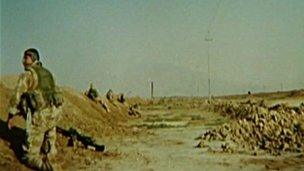
The claims followed a major gun battle near Majar al-Kabir in southern Iraq
A "very angry" sergeant fired bullets into the bodies of Iraqis who were still "twitching" after a gun battle, the Al-Sweady inquiry has heard.
Ex-army private Duncan Aston also said he saw a soldier stamp on the head of a dead Iraqi and others attack detainees.
The inquiry heard other soldiers did not agree with his version of events.
The inquiry is examining claims, denied by the Ministry of Defence, that UK troops mistreated and killed detainees after the 2004 "Battle of Danny Boy".
It seeks to identify the events surrounding the deaths of more than 20 Iraqi men and is concerned with a battle during the Iraq war which is named after a British checkpoint near the town of Majar al-Kabir in southern Iraq.
Lawyers acting for several Iraqi clients claim some were taken alive and mistreated or unlawfully killed at Camp Abu Naji and Shaibah Logistics Base.
Mr Aston said he was sent from nearby Camp Condor to the aftermath of the clash, which began when a British "rover" group was set upon as it travelled to Camp Abu Naji.
He said he was collecting weapons from dead Iraqis when he noticed two were "twitching".
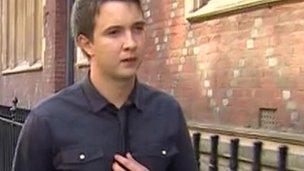
Former private Duncan Aston left the army in 2005, the inquiry heard
"At the time, I assumed that, because they were twitching, this meant that there must be some life there," he said.
They appeared to be "somewhere between life and death" but looked beyond the help of medical attention, he added.
He said he then saw his platoon sergeant, Paul Kelly, approach "looking very angry".
His sergeant tried to fire at one of the men but his weapon did not work and "he then threw his rifle to the ground and said words to the effect of 'give me your weapon'," Mr Aston added.
"He put a full magazine of bullets into both bodies that had been twitching but he also fired into the bodies of the other dead gunmen in the ditch," he said.
"The bodies of the two twitching gunmen stopped twitching - there was no other reaction from the bodies.
"They did not make any other noise, they just stopped twitching."
'No aggression'
Twenty-eight-year-old Mr Aston - who was 18 at the time - said his sergeant then gave him his gun back and they did not mention the incident again.
Mr Aston believed the Iraqis who had been shot had been "certainly going to die" and he therefore thought "what he had done was a bit sick and degrading but not something worse", he added.
He said he later spoke to another private, who had witnessed the incident, and they had both agreed not to tell the Royal Military Police in case "Sgt Kelly might find out and cause problems for us in the army in some way".
Mr Aston also said that another private had gone "straight towards" the body of a dead Iraqi in a ditch "and stamped on their head basically".
Mr Aston told the inquiry that - in a separate incident in a derelict building after the battle - he saw two privates hitting and kicking a detainee "several times each", landing blows to different parts of his body "including his face, shins and ribs".
"Everyone was a bit upset about the whole scenario of British soldiers being ambushed and attacked when we felt we were in Iraq to assist," he added.
He said a third private later arrived and joined in, kicking the detainee two or three times.
"There was no real aggression or wanting to physically seriously hurt him, it was more intimidation and bullying rather than wanting to cause him any serious harm," Mr Aston said.
Asked why he had not reported any of the incidents, he said he did not want to "grass" on his friends.
The inquiry heard that other soldiers disagreed with his version of events but, under questioning from Neil Garnham QC - representing hundreds of soldiers involved in the case - Mr Aston denied he was a "fantasist".
He told the inquiry he could not explain why the man he said had been assaulted in the derelict building had not made any allegations of such an attack.
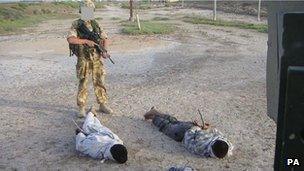
The so-called Battle of Danny Boy was fought on 14 May 2004
And he dismissed the idea, put to him by Mr Garnham, that Sgt Kelly - who the inquiry heard had won a Military Cross related to a previous incident in Iraq - had, in fact, fired into the ditch because he thought armed insurgents posed a threat.
The Al-Sweady inquiry - set up in 2010 - is named after one of the Iraqi men, 19-year-old Hamid al-Sweady, who is alleged to have been unlawfully killed while being held following the battle.
Three years passed between the setting up of the inquiry and its opening as staff, including retired detectives, trawled through as many as 12,000 documents.
Evidence from Iraqi witnesses was heard from March-July.
The inquiry, which has so far cost more than £19m so far and is due to report back by the end of 2014, is being chaired by retired High Court judge Sir Thayne Forbes at Finlaison House in central London.
- Published17 December 2014
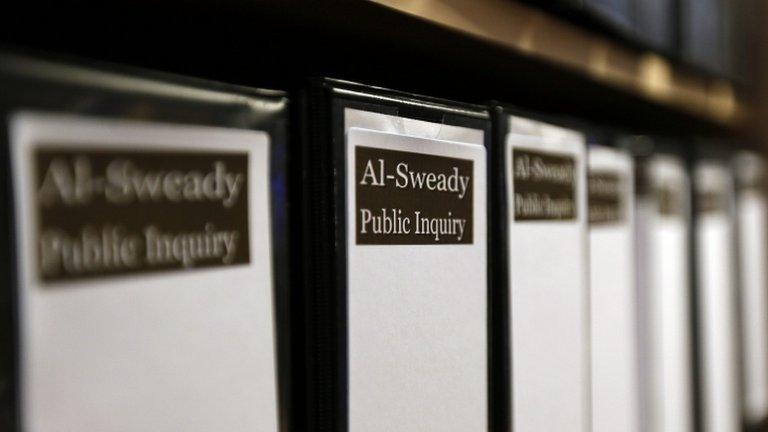
- Published2 September 2013
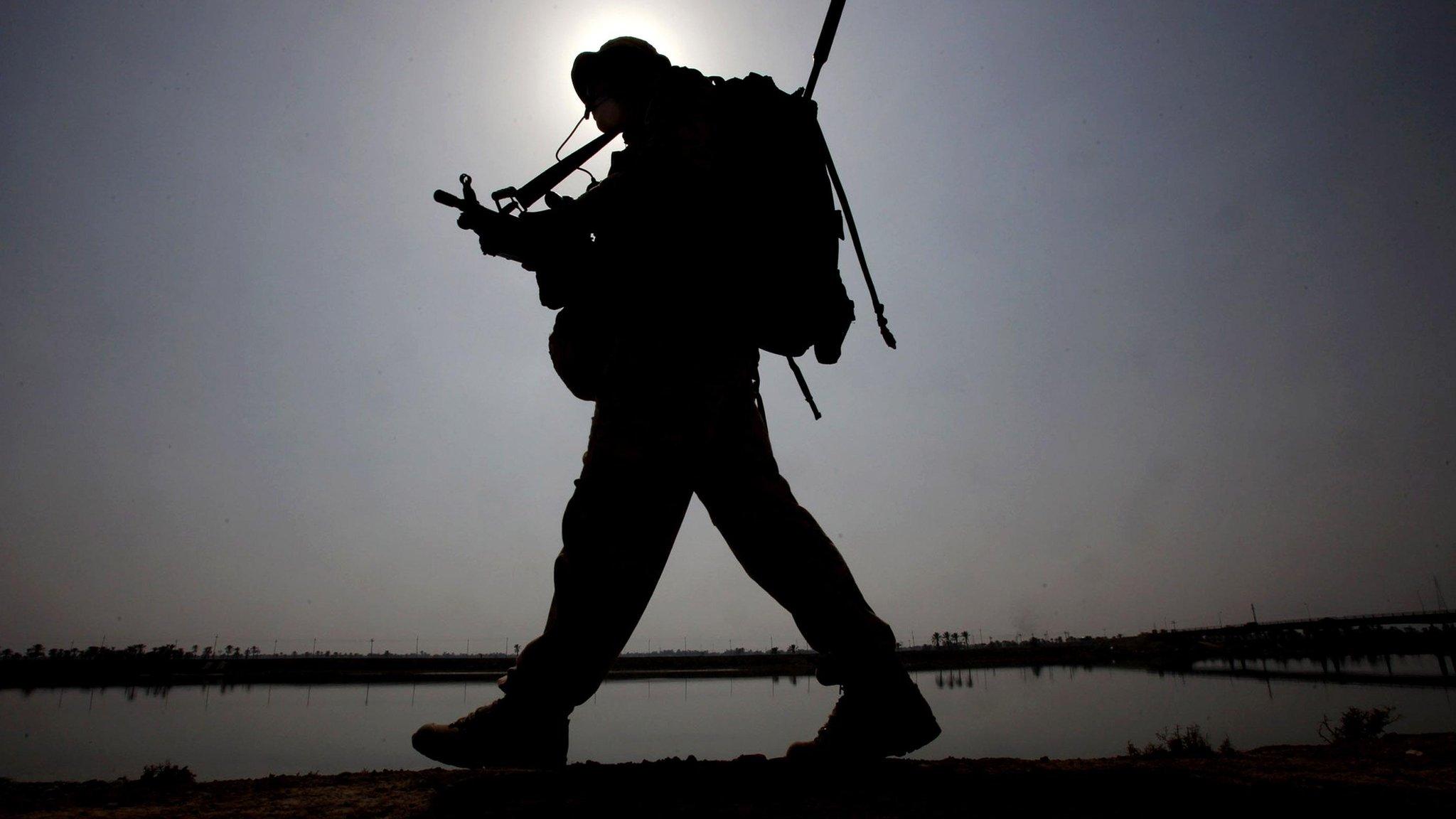
- Published18 April 2013

- Published4 March 2013
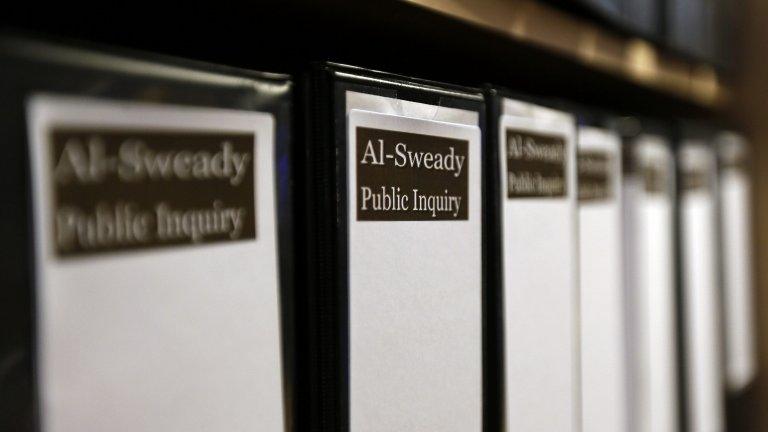
- Published4 March 2013
